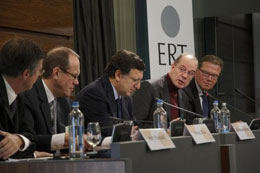Business, EU – Baltic States, Markets and Companies
International Internet Magazine. Baltic States news & analytics
Sunday, 29.06.2025, 06:28
Unified approach to business: European industrialists’ appeal
 Print version
Print version |
|---|
The European leading executives acknowledged in London that “Europe needs to act with a more unified voice on economic, financial, trade and education issues or face global irrelevance”. This message sounded at an yearly meeting of the biggest regional companies, the European Roundtable of Industrialists, ERT uniting more than 50 continent’s leading businessmen. The ERT’s contribution to the debate on Europe’s industrial future is significant because the organisation unites members which run companies with revenues of €1,600 bln and employ 6,5 mln people. European business leaders are optimistic about the continent’s perspectives in the long term, but only if the region acts immediately on a range of urgent issues.
Challenges and solutions
The appeal from the European Roundtable of Industrialists expressed their desire for concerted action to ensure that the financial crisis in numerous euro-zone states (such as Greece, Ireland, Portugal, etc.) would not threaten the stability in other parts of Europe. The ERT unites chief executives and chairmen of companies such as BP, Fiat, Unilever, Siemens, British Airways and other main industrial firms.
The ERT calls for a European commitment to multilateral global trade talks and the creation of a proper single market on the continent for services and the movement of people.
“Europe has 500 mln people compared with 300 mln in the US. It needs to play as one single player in economic terms, particularly vis-à-vis the Brics,” said Mr. Gerard Kleisterlee, chief executive of Dutch group Philips and vice-chairman of the ERT. He added: “The risk is that we increasingly try to find local solutions for local problems. We need to see macroeconomic and financial discipline”. Mr. Leif Johansson, chief executive of Volvo, the Swedish truck company, and ERT’s chairman, said: “There is a great risk that we are marginalising Europe. We need to respond more aggressively. We have a situation every now and then in Europe where we are too pessimistic. But the starting point isn’t too bad . . . We need to make Europe more competitive in the global market and complete the single market so that we have a big enough domestic region for companies”, Mr. Johansson said.
[Milne R. Business plea for unified EU voice. –Financial Times, 1 February 2010, p.6].
The single market for goods had been one of Europe’s main achievements. However, progress in such European internal market sectors as services, free movement of people and capital had been less successful. Members of the ERT particularly pointed to the need to make the labour market more flexible for young people to move to different European countries.
Recommendations
The European CEOs warned that demographic problems would soon mean a shortage of hundreds of thousands of engineers in European companies in very recent future. They called for open immigration of well-qualified foreign engineers to the EU, a controversial issue in some member states.
The ERT calls for European governments and companies to respect the EU’s Growth and Stability Pact, first of all, by cutting spending if necessary to control deficits.
However, one of the ERT’s main recommendations is for the governments to support investments in green technologies and pursue re-industrialisation on a modern highly technological level.








 «The Baltic Course» Is Sold and Stays in Business!
«The Baltic Course» Is Sold and Stays in Business!

